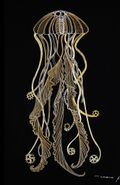Free Expression-Art



157 foot long mural that the U.S. military commissioned
[0=AT1_HtmcgXL1GNl8eGFBvq44fYM93CVdoie78nQhCK8vidYLEd28t3JrdohTsKVErrt7OR5NvtLT3g2fwtqXdEew6XZ-8YaJaEeMj1bfuZYXbu43TpX0imnUTMiM_mprqnPBVjnmnxKr7nv8HTUo-7AzF9x_EAReGAB7EjutKKx28zAJgzHZs9Emew|Zorthian Ranch Giant 1940's era anti-war mural]
Painted by the master painter Jirar Zorthian in 1945, it’s epic in it’s portrayal of the military industrial complex in all it’s insidiousness.
How an Oregon battle between human and nature inspired Frank Herbert’s ‘Dune’
By John Notarianni (OPB) Oct. 23, 2021
Herbert came to Florence in 1957, planning to write an article documenting this battle between man and nature. He was awestruck by the power of the blowing desert sand. As he wrote in a letter, “These waves can be every bit as devastating as a tidal wave in property damage.”
‘Give me your tired, your poor’: The story of poet and refugee advocate Emma Lazarus
Washington Post 02/01/17 By Katie Mettler
What the poet didn’t know at the time — as a woman whose work as a “poetess” had been at times the subject of condescension — was that it would be her words, lyrical and poignant, that decades later came to define the American vision of liberty.
The Modoc and The Matah Kagmi
<embed>https://m.facebook.com/story.php?story_fbid=852682198181190&id=100003182527007</embed>
Story if a Modoc Indian who encountered Bigfoot or Sasquatch.
Phillis Wheatley 1753–1784
<embed> https://www.poetryfoundation.org/poets/phillis-wheatley </embed>Poetry Foundation 2020
Wheatley was seized from Senegal/Gambia, West Africa, when she was about seven years old. She was transported to the Boston docks with a shipment of “refugee” slaves, who because of age or physical frailty were unsuited for rigorous labor in the West Indian and Southern colonies, the first ports of call after the Atlantic crossing. In the month of August 1761, “in want of a domestic,” Susanna Wheatley, wife of prominent Boston tailor John Wheatley, purchased “a slender, frail female child ... for a trifle” because the captain of the slave ship believed that the waif was terminally ill, and he wanted to gain at least a small profit before she died. A Wheatley relative later reported that the family surmised the girl—who was “of slender frame and evidently suffering from a change of climate,” nearly naked, with “no other covering than a quantity of dirty carpet about her”—to be “about seven years old ... from the circumstances of shedding her front teeth.”
On Celtic Storytelling, From the Bardic to the Mythic
<embed> https://lithub.com/on-celtic-storytelling-from-the-bardic-to-the-mythic </embed> LIterary Hub By Martin Shaw July 17, 2020
Celtic storytellers have endured and enjoyed a roguish reputation through the millennia. Their place is rarely the court of the high bards, rather the firesides of taverns and farmhouses. Their task is not to perfectly preserve great, rigid tracts of history for the financial benefit of their lordly patrons, but to spin the gossip of the hedgerows, the magic of fairy, the grief of the village to their attentive and hearth gathered listeners.
'Cronk rules everything around me': long-lost beverage resurrected after 120 years
<embed> https://www.theguardian.com/world/2020/jul/03/dr-cronk-drink-canada-brewery </embed>
Odd ads for Dr Cronk’s Compound Sarsaparilla Beer, once wildly popular, went viral on Twitter. Now a Canadian brewer is bringing it back
Acclaimed Russian director convicted but not sent to prison
<embed> https://abcnews.go.com/Entertainment/wireStory/acclaimed-russian-director-convicted-prison-71474017?cid=clicksource_4380645_2_heads_hero_live_headlines_hed </embed> ABC 6/26/20
The funds were for staging several productions, and investigators initially alleged that the director and his associates stole money through a show that never saw the light of day. In fact, the production was staged to critical acclaim. The investigators later withdrew their claim, and have not since clarified where they believe money was stolen from. Serebrennikov had rejected the accusations as absurd; many in Russia saw the charges as punishment for his anti-establishment views. His productions, ranging from drama to opera and movies, have mocked official lies, corruption and growing social conservatism.
Recording of "Stories of Druid Heights" event
Audio recording of "Stories of Druid Heights" event held at the Mill Valley Public Library on June 25th, 2018. The event was described on the Library website as follows: "Share your stories about the Muir Woods enclave where Alan Watts, Elsa Gidlow and other literary luminaries once lived. Or come and listen as others discuss this unique bohemian community. Author and former Druid Heights resident Hallie Iglehart Austen will moderate." The event begins with an introduction by History Room Librarian Cate Mayfield, followed by a brief talk by National Park Service Park Ranger and Marin Community Liaison Mia Monroe. Monroe provides historical background on Druid Heights and discusses the Golden Gate National Recreation Area's efforts to protect the site. Hallie Iglehart Austen then moderates a series of personal stories from people who lived at or visited Druid Heights during its heyday. Stories include those by: Elaine Belle, Fabrice Florin, Marcelina Martin, Diane McDonald, Roger Packer, Jennifer Spindell, Gerd Stern, and Jan Van Vlaenderen.
Elizabeth Cotten and Rhiannon Giddens
<embed> https://www.dailykos.com/stories/2020/5/17/1944048/-From-Libba-Cotten-to-Rhiannon-Giddens-the-North-Carolina-Black-folk-tradition-persists </embed> DailyKos 5/17/2020
"At the age of 11 (a few sources say 12), Elizabeth “Libba” Cotten wrote a song called ”Freight Train,” which would go on to become a folk classic. Yet she didn’t reap the benefits of her lifelong talent until she was 66 years old and a great-grandmother. Rhiannon Giddens was born Feb. 21, 1977, in Greensboro, North Carolina. A recipient of the prestigious MacArthur Fellowship in 2017, she tells her own story in this short video, including her desire to reclaim the banjo as a key instrument in African American music history."
Yup’ik Masks (Photo Diary)
<embed> http://nativeamericannetroots.net/diary/Indians-101-Yup-ik-Masks-Photo-Diary </embed> Native American Net Roots 11/20/2019
For the Central Alaska Yup’ik Eskimo, spirituality was focused largely on the need to secure food for hunting. As with other animistic hunting peoples, animals were felt to have souls which would be reincarnated. Thus, rituals sought to appease the soul of the animal so that it would give itself to the Yup’ik hunters who needed its meat.
Today, many museums consider Yup’ik masks to be works of art. Shown below are some of the Yup’ik masks which have been displayed in the Portland Art Museum and in the Maryhill Museum of Art.
Zombie flu: How the 1919 influenza pandemic fueled the rise of the living dead
<embed> https://theconversation.com/zombie-flu-how-the-1919-influenza-pandemic-fueled-the-rise-of-the-living-dead-123960 </embed> The Conversation 10/28/2019
In his story “Herbert West: Reanimator,” for example, Lovecraft creates a ghoulish doctor intent on reanimating newly dead corpses. A pandemic arrives that offers him fresh specimens – and that echoes the flu scenes of mass graves, overworked doctors and piles of bodies. When the head doctor of the hospital dies in the outbreak, Dr. West reanimates him, producing a proto-zombie figure that escapes to wreak havoc on the town. The living dead doctor lurches from house to house, ravaging bodies and spreading destruction, a monstrous, visible version of what the flu virus had done worldwide.
The first fairytales were feminist critiques of patriarchy. We need to revive their legacy
<embed> https://www.theguardian.com/books/2019/nov/11/the-first-fairytales-were-feminist-critiques-of-patriarchy-we-need-to-revive-their-legacy </embed> The Guardian 11/11/2019
But this story is a myth. Fairytales were invented by the blue blood and pomaded sweat of a coterie of 17th century French female writers known as the conteuses, or storytellers......In the closing years of Louis XIV’s reign, French society had become dangerously religious and conservative. Prominent clerics argued for the banning of plays at Versailles, and art forms such as female-authored novels suffered increasing criticism.
